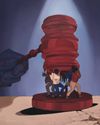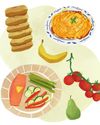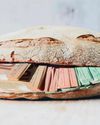
IN THE SPRING OF 2022, beneath the dense cover of London's interminably grey sky, two men slipped into the British Museum and headed for the basement. They were dressed in black, wearing hockey masks and carrying nylon bags, as if freshly defected from The Purge franchise. Though some unnerved patrons alerted security guards, nothing could really be done. When the men reached the windowless gallery that houses some of the world's most famous collections of African art, they set about methodically stealing the treasures, one by one. They left through the front doors in broad daylight and emerged into the courtyard triumphant and untouched.
The targets of the operation were the famed Benin Bronzes, a group of sculptures that for centuries adorned the royal palace in the Kingdom of Benin, now located in present-day Nigeria. In 1897, British forces invaded the capital and massacred hundreds of Africans, exiled their leader, bagged everything that looked valuable, then razed the city, including the palace. The masterpieces they transported back to London included thousands of commemorative heads cast in brass, brass plaques, and intricately carved ivory sculptures. These were sacred records of the sovereignty, politics, and history of the Benin kingdom. The officers sold off or gave away many of the pieces upon their return home; these relics are today scattered globally across roughly 150 museums and galleries and some unknown number of private collections. A chunk remain in Britain.
Along with Greece's Elgin Marbles, the Bronzes are the most visible symbol of the movement to return looted heritage to where it came from. The question raised by the caper at the British Museum, perhaps the world's largest beneficiary of stolen art, was simple: If someone robs something from you and you choose to take it back, does it really constitute a crime?
Esta historia es de la edición JanFeb 2024 de The Walrus.
Comience su prueba gratuita de Magzter GOLD de 7 días para acceder a miles de historias premium seleccionadas y a más de 9,000 revistas y periódicos.
Ya eres suscriptor ? Conectar
Esta historia es de la edición JanFeb 2024 de The Walrus.
Comience su prueba gratuita de Magzter GOLD de 7 días para acceder a miles de historias premium seleccionadas y a más de 9,000 revistas y periódicos.
Ya eres suscriptor? Conectar

Mark Her Words
Forget polite verse Mary Dalton wants you to feel the salt and soil of Newfoundland

All for Show
Jani Lauzon has maintained she is Métis and her play 1939—now touring Canada—is based on her father’s experience at a residential school. What if none of it is true?

My GUILTY PLEASURE
REVISIONS TO this essay have been on my to-do list for weeks.

LEGAL CHALLENGE
Racialized professors say they were underpaid, bullied, and ignored at one of Canada’s top law schools

Circuit Breakers
Inside the Canadian company betting millions on human-like robots

Pack Ice Season
THE ICEBERG slid in on a Sunday morning when the water was as flat as a fresh sheet of tin foil.

Inside Second Harvest’s Fight Against Food Waste
How this ambitious non-profit juggles food rescue, research, education, and advocacy to reduce food waste, combat climate change and feed hungry Canadians.

Should the Arctic Really Brace for an Invasion?
The people who live there would rather see more housing and maybe some dentists

Sticker Shock
From $8 coffees to $20 sandwiches, consumer rage is real—and it's shaping the next election

A Baby? In This Economy?
The cost of parenting keeps going up